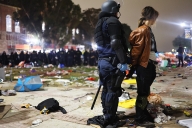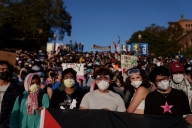You have /5 articles left.
Sign up for a free account or log in.
On March 15, in the early hours of the morning after the bloody shootings at New Zealand mosques, Beloit College student Nathaniel Acharya made an emotional post to a campus Facebook group.
Little did he know that this -- and other statements on his social media -- would set off a free speech battle at Beloit that Acharya said resulted in his temporary suspension and removal from the private institution’s grounds.
Acharya has since been reinstated, but placed on probation. The college has refused to discuss his case, despite Acharya alleging he was targeted for his religion and background. The kerfuffle comes at a time when free expression in higher education has broadly been called into question -- President Trump last week signed an executive order threatening to cut off research funds to colleges that do not support free speech.
Acharya, who is Muslim, wrote in that post about how he was sick of the attacks against those who practiced his religion (the shooting killed 50 worshippers and injured 50 more) and other minorities. He said his post was an open letter to the campus chapter of Young Americans for Freedom (YAF), a national conservative group, and its leader, who planned to bring Erik Prince to the college to speak on March 27. Prince is the brother of Education Secretary Betsy DeVos and known as the controversial founder of Blackwater, a military security company that has been accused of crimes against Muslim people in many countries.
“I would like it to be public record that I, personally, at least, have had it with your shit,” Acharya wrote to the group. “To everyone with a basic sense of human decency, let’s organize to repel the March 27th invasion of our college, lest we be complicit in it and all that it represents.”
Two days later, Acharya received a letter from the college. Administrators alleged he was engaged in “acts of serious of misconduct” that violated the college’s policies.
The letter stated he had been accused of intimidating others and threatening violence, and referenced two social media postings (neither was the Facebook post against YAF).
The first was a Facebook post he had made that included a photo of someone else’s violent tweet. The original tweet read “don’t worry, revenge is coming” with a picture of a gun. Acharya wasn’t endorsing the message in that tweet, but urged his social media followers to stay safe.
He wrote that if the person was to “spray his bullets at the fascists, then perhaps he will rest among the green birds,” which is reference to his religion -- green birds are the souls of dead martyrs who live in paradise. Acharya was essentially saying that if the person was fighting fascists, he will enter heaven.
“Should he be one of those poor brothers that is only anger and no rationality, his will not be the resting place of the righteous,” Acharya wrote, indicating that if the person would murder innocent people, he will end up in hell. “Stay safe my friends. Please.”
The second of Acharya’s postings was a photo on Snapchat with a caption that read “Hey if you post on 4chan or [8chan] I don’t care what board you’re part of, you deserve to be shot for knowingly [participating] in one of the biggest breeding grounds for white supremacist terrorists of the modern era.”
Both 4chan and 8chan are social media platforms, but far less regulated than are Facebook or Twitter. They generally allow for memes and other showings of support for white nationalism. The alleged New Zealand shooter espoused white supremacist ideology, and he and his supporters were active on those platforms.
Acharya said that the proceedings against him were unfair.
The rest of the letter he received, as is common for campus disciplinary process, detailed where his hearing would take place, which administrators he would be facing and told him he was allowed a “support person” -- who could be a peer, professor, even an attorney.
But the problem was Acharya’s hearing was supposed to take place that day at 3 p.m. -- less than an hour after the letter had been delivered, he said.
This gave him no time to scrounge up someone to attend with him, he said. The hearing was also scheduled during spring break, which meant fewer people were on campus.
After the hearing, Acharya said he was suspended from the college and barred from campus pending a second hearing and a final meeting to decide the verdict against him. He said that the administrators in the first meeting mentioned the social media posts in the letter, but also the post against YAF.
Acharya’s friends launched a full campaign -- writing down the series of events and posting about his situation to Facebook and contacting media.
Another of Acharya’s friends created a petition, which she said was signed by nearly 300 people in the 24 hours after she published it online March 18. On Tuesday, the day of Acharya’s second hearing, his friends said that more than 50 students and a couple of professors camped outside the Office of Residential Life with signs that read “Nate Is Not a Threat/White Supremacy Is the Threat” and “Bring Nate Back.”
The petition read in part, "I condemn and protest the behavior of Beloit College in their choice to suspend him, and in the way the institution has responded to the alleged 'threats' he made on social media. The posts in question are not threatening, nor do they incite violence, which is more than can be said for the ideology [white supremacy] Nathaniel spoke out against."
Administrators lifted the interim ban against him on campus on Tuesday, saying that their investigation determined there was “no evident threat to campus,” according to a letter from the college.
In the letter Acharya received Wednesday, the college called his social media postings “disturbing” and said they could be construed as threatening to the campus. However, administrators acknowledged Acharya did not intend to threaten violence. The college said he violated the conduct code and put him on probation through May 19.
“Any student or student group at Beloit could consider your posts, individually, or in their totality to be intimidating and an effort to shut down speech you disagree with,” the administrators wrote. “Your personal views are welcome, but introducing the subject of guns and shooting people into the discussion is not acceptable at Beloit, or likely anywhere else. This is true whether you subjectively intended to harm anyone or not. Your communications are treated the same way as they would be if made by another student objecting to another speaker that you agree with.”
Tim P. Jones, a spokesman for the college, declined to discuss Acharya’s case, citing federal privacy laws. Asked what kind of speech that college would consider threatening and in violation of the conduct code, he said, “Every situation is unique and requires a great deal of context. The college follows its processes and procedures in the student handbook."
Acharya said he appreciated how the college handled his hearing, but he said he believes he was singled out because he was a minority. He pointed to Prince’s scheduled appearance -- he said the college feels comfortable giving Prince a platform, but pursued him for no reason.
“There’s not a lot of Muslim students here; I can count us all on two hands. They tend to really jump to conclusions pretty easily,” Acharya said.








